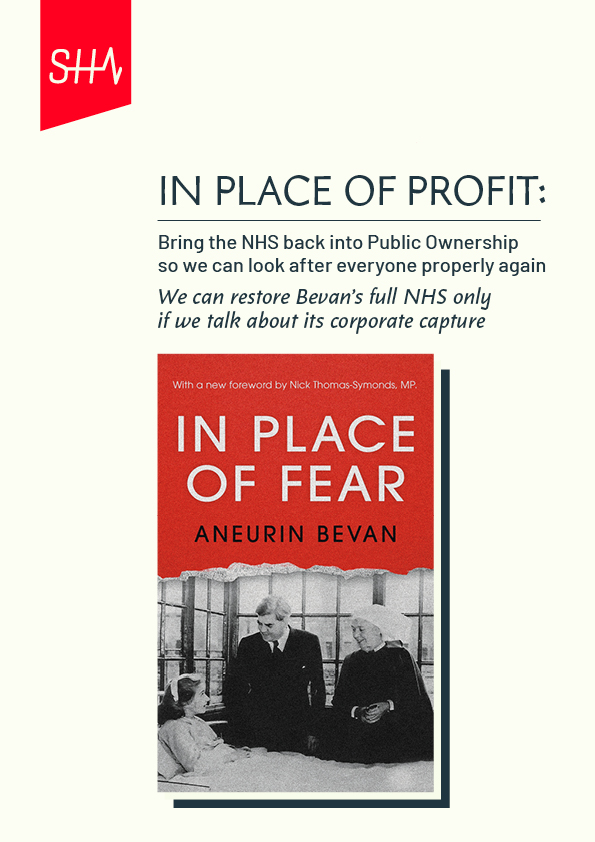
Download ‘In Place of Profit’ Report
England’s NHS services have been pruned back from comprehensive, universal provision, to make space for the global healthcare industry.
This paper argues that the industry’s means for reaching into the healthcare market include donations to MPs and, importantly, a revolving door between profit-making and state healthcare institutions. And that all such means must be understood within the context of the wider, policy drive against comprehensive/universal medical care, which has reproduced key elements of US government healthcare legislation and policy – notably Nixon’s 1973 HMO Act and the US Affordable Care Act 2010 (“Obamacare”), and that these forays must be reversed as a precondition for recovering our illegitimately attacked NHS.
We produce this document in the year of the 75th Anniversary of the creation of the NHS. The NHS’ 1948 creation under Aneurin Bevan’s “In Place of Fear” gathered all health services and staff under public control, to bring everyone the healthcare they needed – from local general practice to the local general hospital. This would wipe out private, for-profit health care.
Bevan noted with satisfaction how these
“…innumerable harpies who battened on the sick […]
are slowly being eliminated”.
For the harpies, the service and the wider welfare state became a problem to solve.
Most of the UK still cherishes Bevan’s agenda and the principle upon which the NHS was founded: that the publicly funded and provided NHS would meet everyone’s health needs. Nonetheless, corporate healthcare and its political representatives have led a fourdecade counter-revolution against a service they called “monopolistic”. They have done this to an antithetical, now dominant agenda, of shrinking essential services into socially insufficient profit schemes.
In the US, healthcare corporations’ resistance to comprehensive, universal state healthcare (such as Medicare for All) has been more effective so far- than in the UK1, but the drivers are the same.
We, therefore, have two incompatible agendas illuminated in this paper: the still popular Bevanite state model that was committed to providing all medical care based on need, versus purposefully reducing our public service along corporate healthcare industry models driven by profit.
This corporate model aims to undermine universal and comprehensive provision, as is its clear record in the USA. The changes towards US ‘managed care’ were kicked off in the UK by the 1990’s internal market. This market, created in the NHS as a means of expanding private healthcare ethos and participation has meant retreating from the NHS’ goals. Socially, marketisation is unnecessary.
In contrast to its rhetoric about efficiency, it exists at huge cost, and is a product of corporate capture in pursuit of profit2. To quote Allyson Pollock:
“The law of the market is to create winners and losers. If you are working to contracts, then people are going to trim the services to make profits. Markets work against the interests of patients.”
And to those who say that comprehensive public provision is unaffordable: austerity is a myth. Decades of lived experience say we can and have afforded a comprehensive, public NHS, no matter the age of the population – found by the 1979 Merrick Royal Commission to be the most cost-effective approach3 before it was abandoned. The actual constraint to the provision of services is human endeavour and skill, supported with the necessary buildings, equipment, and services. When the US has non-universal care that costs more than twice as much per head than that in the UK, it is imperative to understand that the political panic button of “austerity” is nothing but an excuse for corporate greed. Why have we emulated the US system in any way unless we wish to prioritise profiteering from sickness and disease over a comprehensive, equitable health service?
What we need is the publicly provided, complete health service operating in the context of a functioning welfare state which holistically addresses the social determinants of health.
